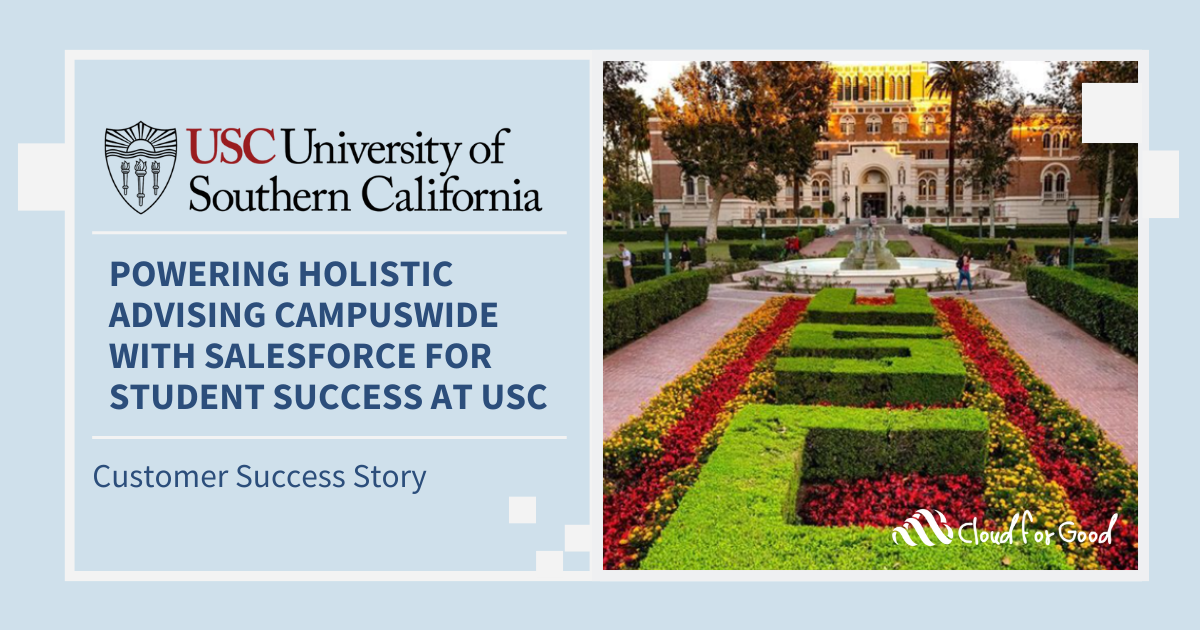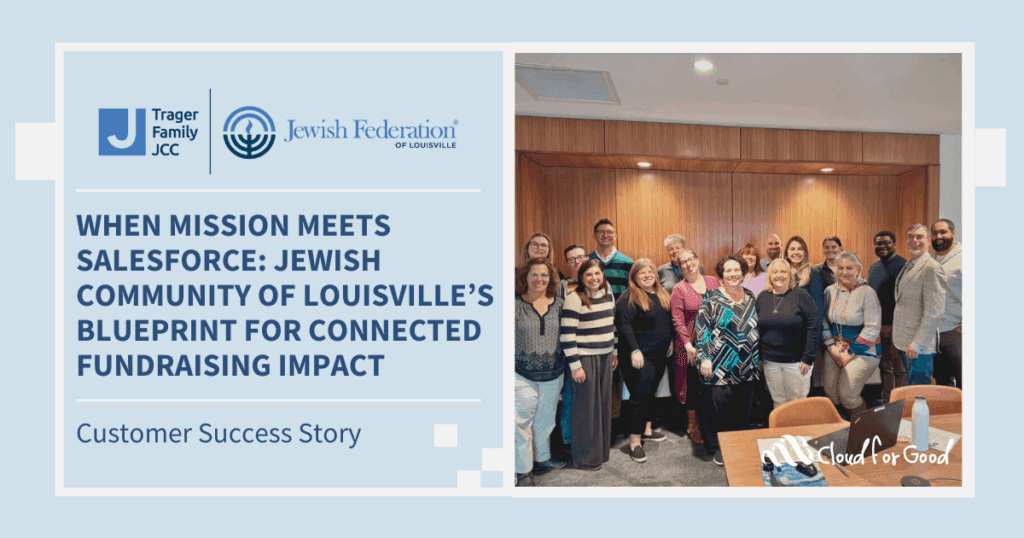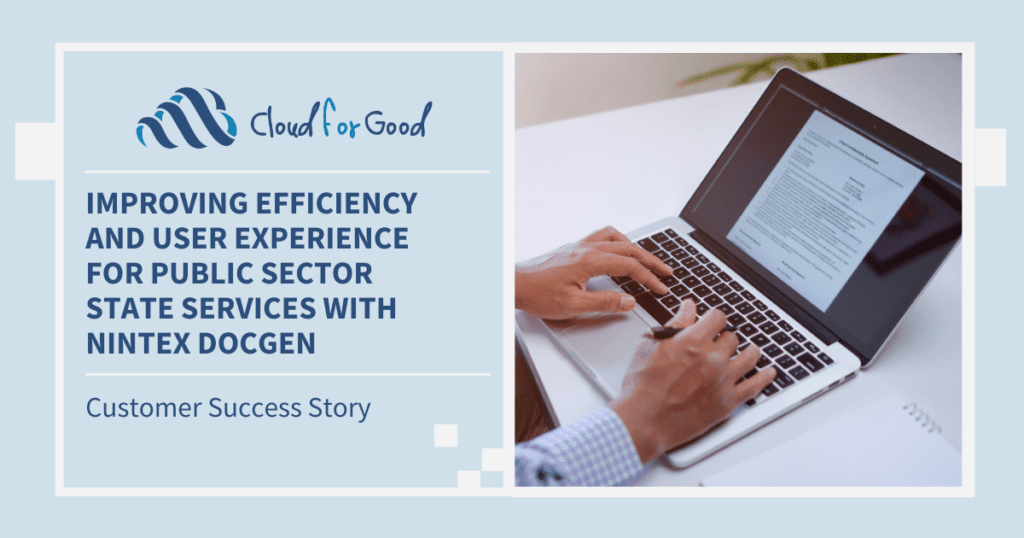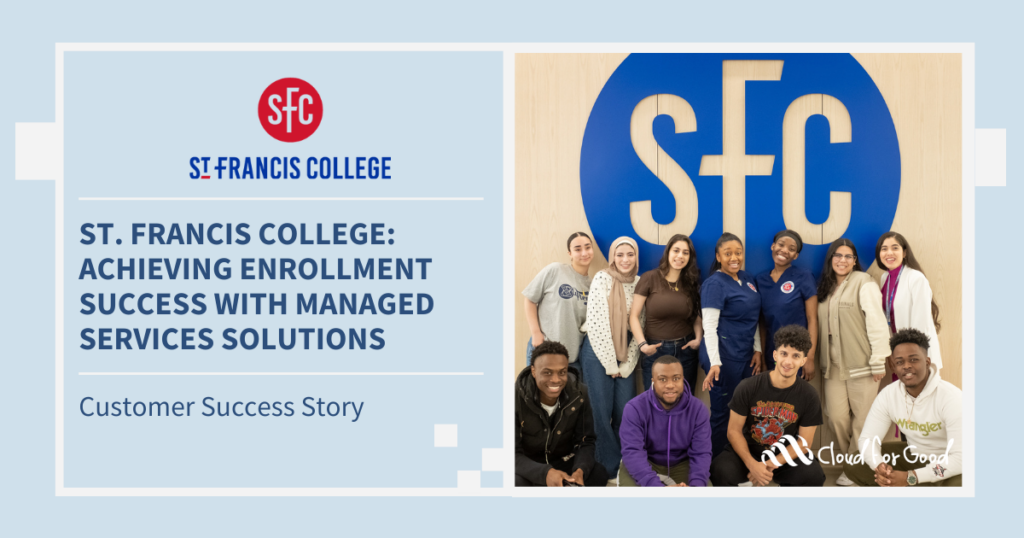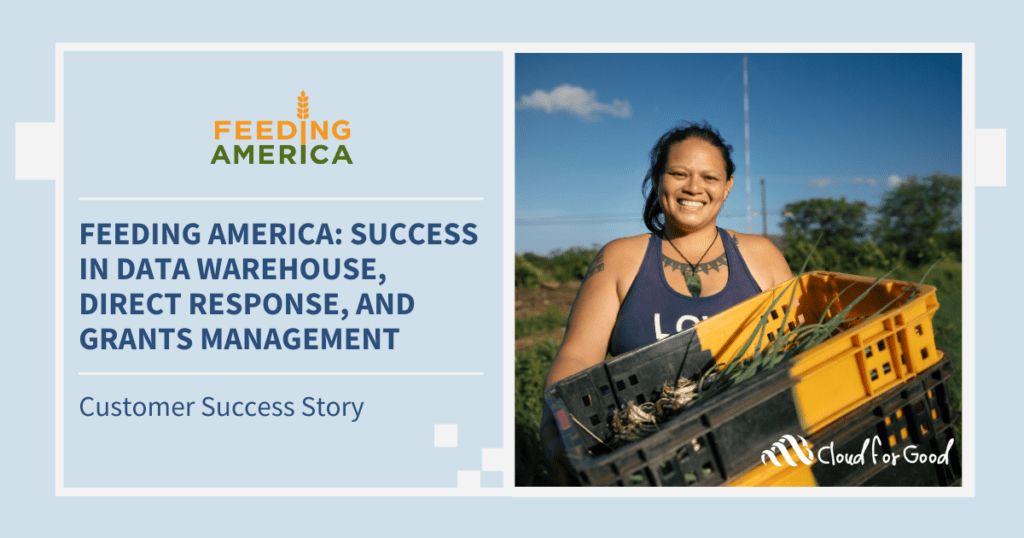The University of Southern California (USC) is a leading and innovative private research university in Los Angeles, CA, which is comprised of 23 schools and divisions. Its central mission is to develop human beings and society by cultivating and enriching the mind and spirit. Its mission is accomplished by teaching, research, artistic creation, professional practice, and selected forms of public service. USC strives constantly for excellence in teaching knowledge and skills to its students while helping them acquire wisdom and insight, love of truth and beauty, moral discernment, understanding of self, and respect and appreciation for others.
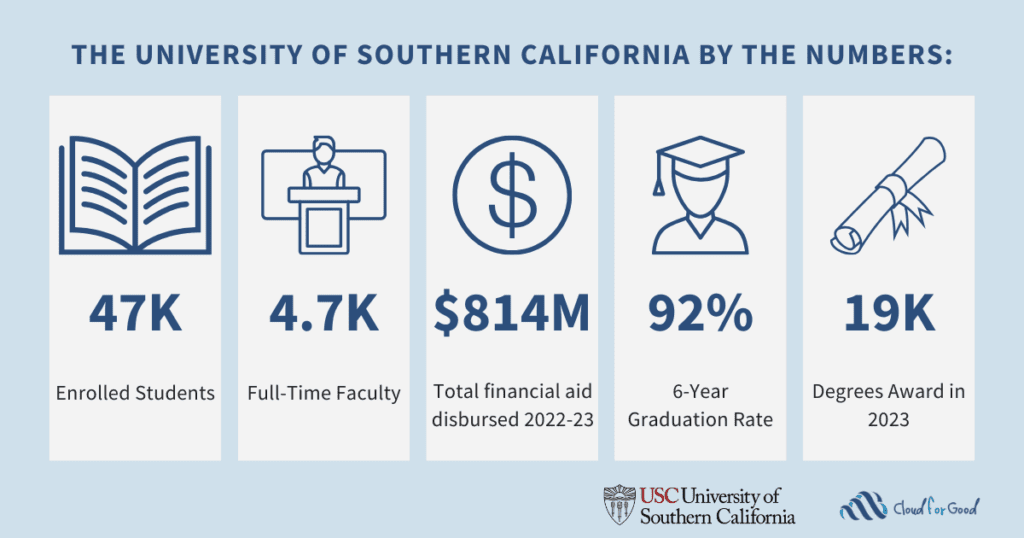
The Opportunity and Challenge: Advise USC
USC’s university-wide undergraduate academic advising platform before Salesforce was Advisement Database (ADB), an on-premises, web-based platform built on Windows Server. This solution, which was state-of-the-art more than 16 years ago, was now aging and lacked a vendor to provide application support.
The use of tools outside of ADB grew each semester, and the proliferation of these tools drove a disjointed advising solution, causing inconsistent data and gaps in the visibility of advisors and their assigned students. Additionally, the tool was only used for undergraduate students, with no comprehensive solution for graduate students, with some units using paper files. Student information was siloed to each unit, so student experience expectations were not always met. Leadership would also be presented with inconsistent data due to multiple disparate student sources.
“We’re a world-class, level-one research university, and we were working with systems that were not living up to their potential—to the detriment of our advisors and our students,” said Sarah Holdren, Assistant Vice Provost at USC. “We needed to figure out how we could support our students and advisors, and one of the best ways to do that is to identify and create a system based on modern technology that can grow and expand.”
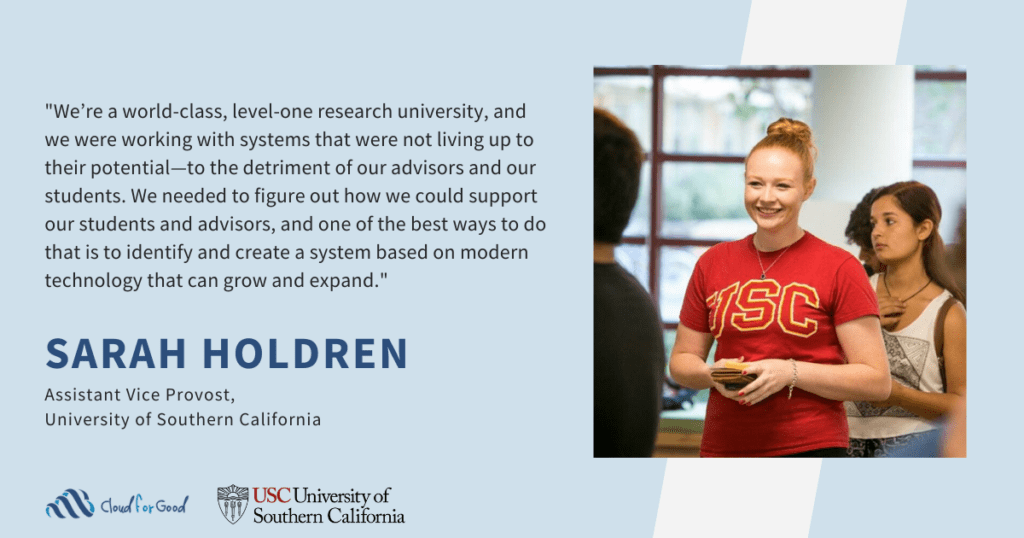
The Solution: Student Success for Advise USC
As a result of the priorities for the Advise USC initiative, USC sought a partner who could help them create a 360-degree view of their students and implement change management strategies to help them develop new advising practices. Cloud for Good has deep expertise in delivering Salesforce implementations for higher education institutions aligned with a human-centered change management approach to drive long-term value and transformational change.
During Cloud for Good and USC’s collaboration—a two-phased technology transformation—Cloud for Good helped USC design and build an enterprise-wide advising system that supported increased student engagement, retention, and success. Specifically, by implementing Salesforce’s Student Success solution.
Student Success: Establishing a University-Wide Single Source of Truth for Students and Advisors
The Student Success implementation included leveraging a core and native Education Data Architecture (EDA), Experience Cloud, and Marketing Cloud support with data integration advising and guidance. In addition, and as part of the phased implementation approach, Student Success was rolled out to select USC graduate student programs in Phase 1 before being rolled out to all its undergraduate and remaining graduate programs and the migration of historical data in ADB to Salesforce in Phase 2.
With Student Success , USC can now support students from their first day on campus through graduation with staff-supported and self-service tools that students need while providing an intuitive and user-friendly experience for advisors and faculty. Furthermore, Student Success centralized all relevant student, learning, and engagement data in one platform to create a single source of truth for advisors, students, and USC leaders.
The implementation of Student Success also enabled several key business capabilities for USC:
- Automated Advisor Assignments, made possible by a mix of configuration and custom development, ensure every USC student has the correct advisor assigned for each program and automatically remove an advisor after a program closes.
- Automated Advisor Mapping records allow programs to predetermine how advisors are assigned based on specific criteria.
- Automated Alerts directed to advisors for students in danger of academic probation based on GPA, accounting restrictions/holds, failing grades/withdrawals, and drop in full-time enrollment status.
- Streamlined Advising Notes with Cloud for Good’s Advising Notes Accelerator enhances the ability to take insightful notes, connect them to appropriate student records, and share them with students while ensuring the notes are protected by an additional layer of security.
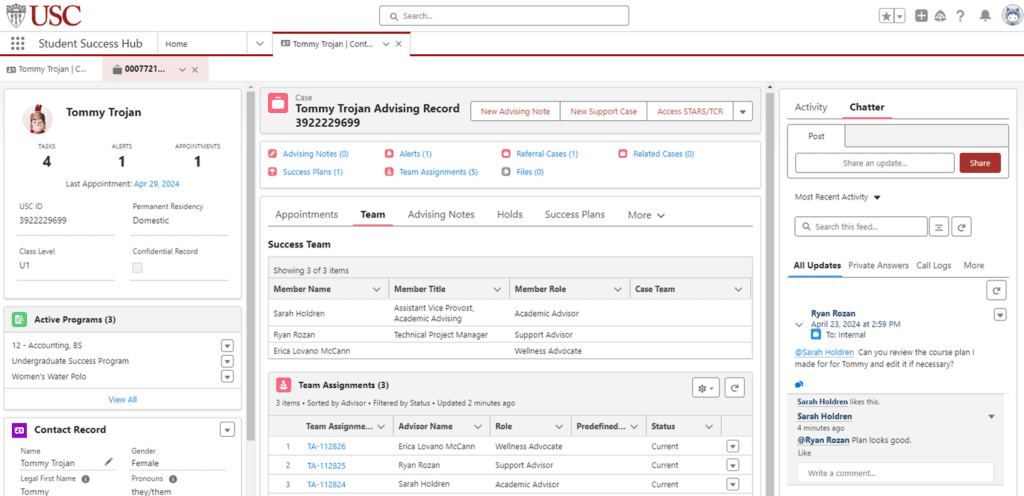
Experience Cloud: Improving Student Experiences and Eliminating Silos
The implementation of Experience Cloud in Phase 1 helped power and establish a self-service student portal that enabled single sign-on, the ability to schedule appointments with their advisors, get support from success teams pushing toward degree completion, complete student submission forms, and provide data-informed alerts about their academic progress and performance as well as deliver tailored success plans. Experience Cloud also enabled advisors to make announcements to students, enhanced with segmentation and case submission features, so students could communicate with their advisors, create support requests, and request to initiate changes in the program or major.
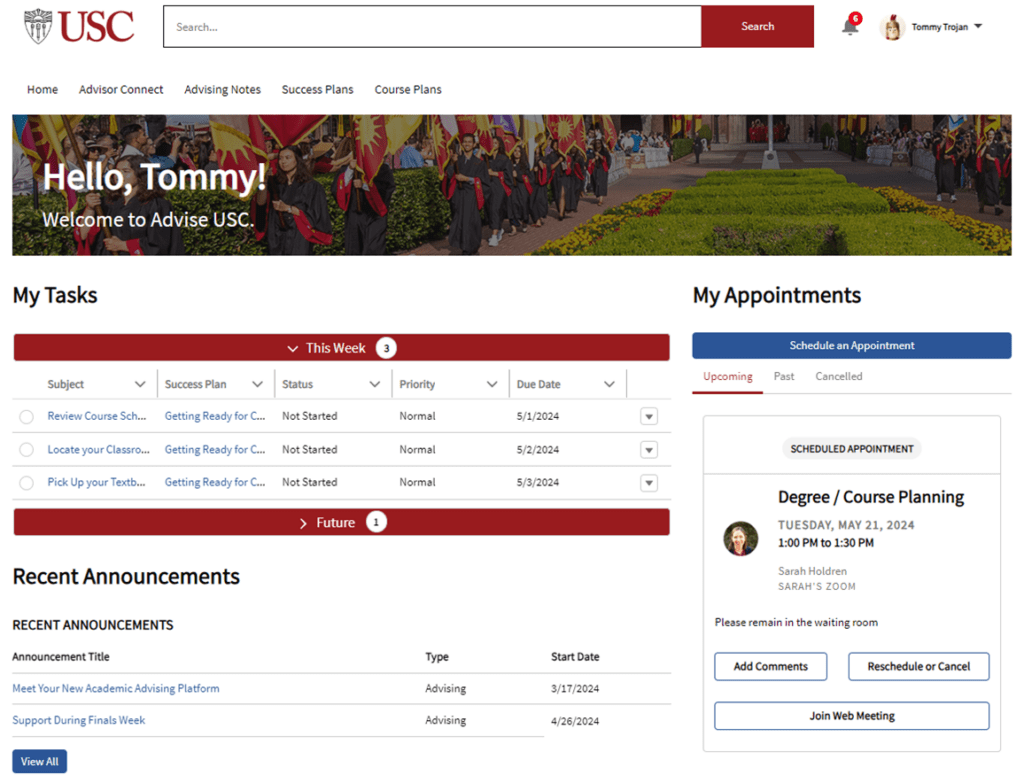
Referrals are made possible through Experience Cloud, a way to connect a student with a specific academic or support unit staff member. Previously, in ADB, only advisors could refer students to other programs and offices. With the new system, students and advisors can make self-referrals, giving students more control over their time at USC. Students and advisors can easily access important information, which is housed centrally in the student portal. Overall, the installation of Experience Cloud has reduced silos between academic units and service units at USC and led to an improved student experience.
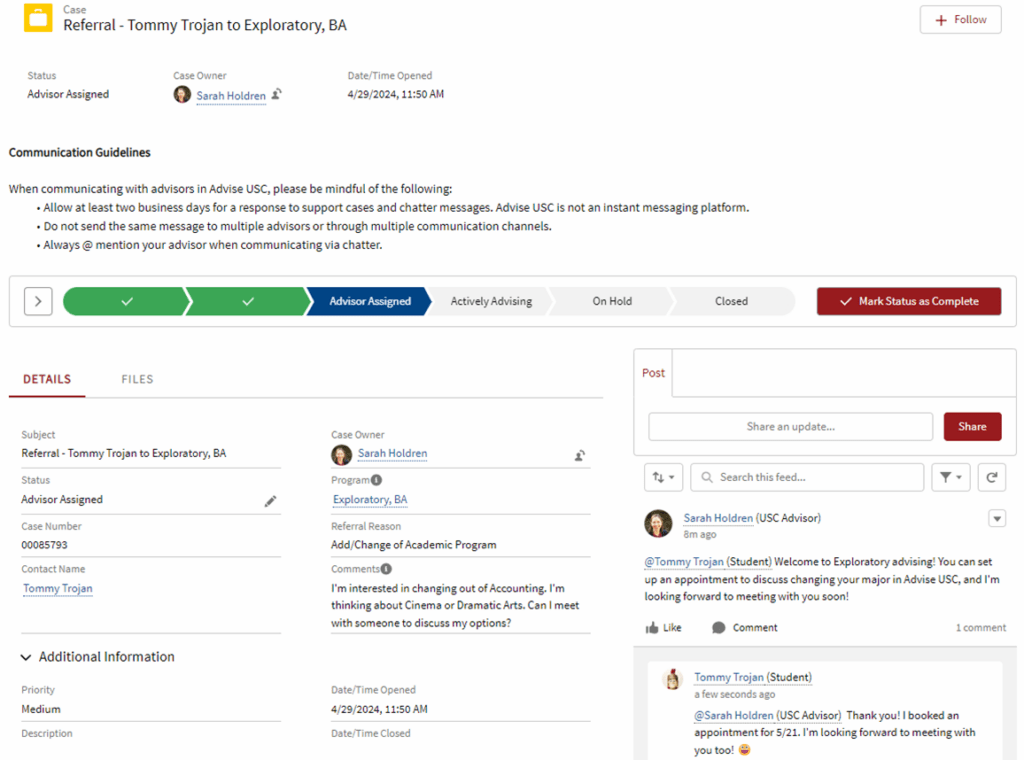
Marketing Cloud: Creating Email Journeys and a Communication Hub
Marketing Cloud established a communications hub within Advise USC, allowing the university to align advising processes across campus and reduce the burden on advisors with personalized engagement based on individual student preferences. Marketing Cloud powers mass communications to students and delivers advising leadership to advisors. USC set up several email journeys through Marketing Cloud, including an introductory email journey to the Advise USC system and a journey dedicated to outreach to students who have not yet registered for future semester courses. The university plans to build additional email journeys that remind students about advising appointments.
Human-Centered Change Management
USC recognized the critical importance of organizational change management in deploying its new academic advising solution. As part of the technology solution for Advise USC, Cloud for Good leveraged a human-centered change management approach to help champion and drive change and user and product adoption of Advise USC.
The organizational change management strategy that USC and Cloud for Good developed and executed comprised an alignment with a future state vision, which helped the USC team gain awareness of how Salesforce improved their work experience and a picture in mind of what the future of their work would look like. Messaging and training specific to each identified user persona impacted by the change in advising solution was utilized. It addressed the benefits of the new solution to that persona, its impact on USC, and how it would improve their work experience.
Cloud for Good helped create a training approach and training materials specific to USC’s objectives for driving awareness of the change in advising solution, adoption of Advise USC, and defining key adoption measures to track adoption progress following Advise USC’s go-live. Training content and training approaches were created and tailored to USC. They developed training assets that included how-to guides, short videos on everyday topics, and 60 to 90-minute training sessions on business processes.
The strategy also included engaging with USC leadership and their support in championing the change and feedback loops to demonstrate the value of the change activities and to guide adjustments to the change strategy. Cloud for Good helped USC implement readiness and adoption measures to sustain their transformation.
The Results
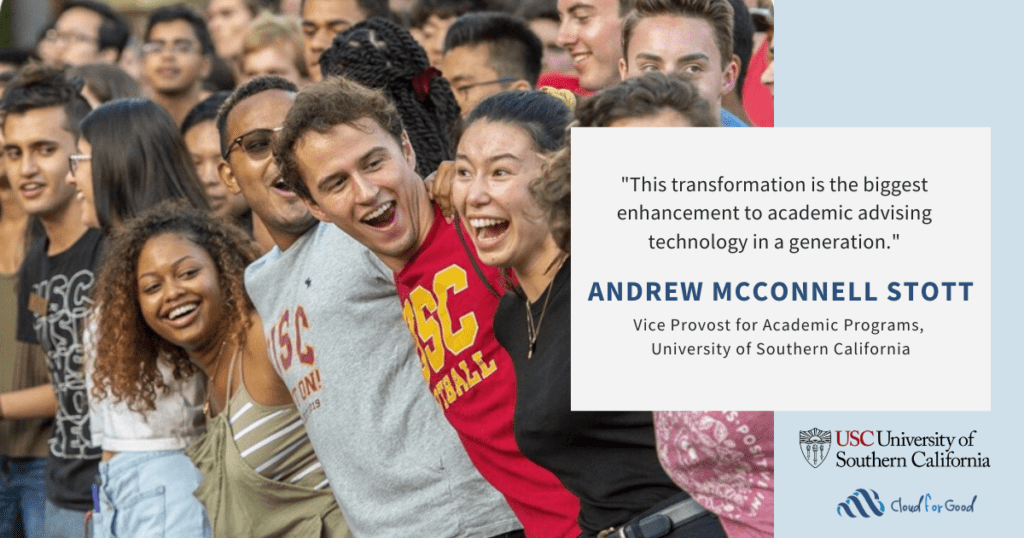
With Cloud for Good’s help, USC launched a new, modern university-wide advising solution. Andrew McConnell Stott, Vice Provost for Academic Programs, deemed this transformation the “biggest enhancement to academic advising technology in a generation.” This initiative aimed to develop new advising practices that drive convergence, inclusion, and timely degree completion while enabling standardization, transparency, and governance across schools and divisions.
As a result of the new advising solution, USC now has a university-wide advisement system and communications tool that is the official repository of USC’s academic advising information and an active product team for product adoption. Students are empowered to take ownership of their degree planning and academic paths with the support of their advisors. As a result of their collaboration with Cloud for Good and following a successful implementation, USC has continued to contract with Cloud for Good and leverage its Managed Services for post-implementation support.
“Cloud for Good helped USC get a full 360-degree view of our students for their academic advisor in terms of essential information, such as what courses they’re involved in, their progress toward their degree, and their GPA. They were a great partner in one of the largest student and faculty-focused technology initiatives ever,” said Holdren.
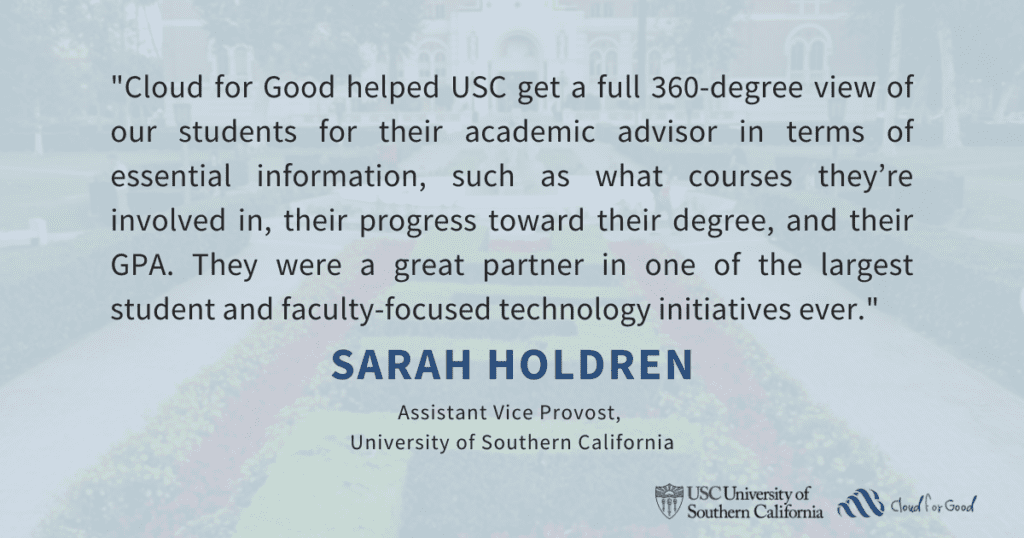
Following the go-live of Advise USC university-wide, the university reported that advisement teams can now access student data they’ve never seen before. Students who sought advisor appointments were found to highly utilize Advise USC’s self-service capabilities for scheduling appointments, with student accounts increasing almost 2% over last year. With that increase came over 20,000 personal program plans created within the first six months of launching the system.
The technology platform created with Cloud for Good also managed, tracked, and responded to support cases as part of the feedback loop for Advise USC. Within the first six months, over 2,500 support cases and 38,000 advising notes were created in the system.
Advisor reports powered by and accessible on Salesforce have been an enormous game changer. “Advisors used to have to hunt around for data from various offices,” explained Ryan Rozan, Provost IT at USC, “Now they can access it themselves.” Holdren also explained that after giving all USC advisors access to report building, advisors are now forming their own reporting committees to build reports to highlight important data. In addition, there is increasing collaboration across departments through Chatter, and USC continues to onboard units that support students across the campus.
Despite only being live for a few months, Holdren is optimistic about the potential of the new advising solution. “We are still scratching the surface of what is possible,” she noted, “We are amazed and impressed at what we’re seeing from both students and advisors.”
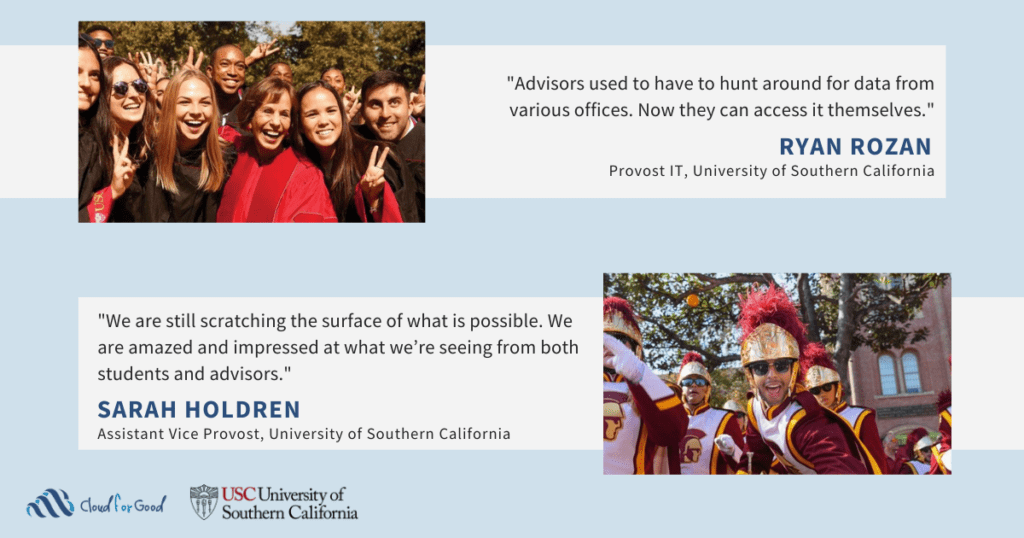
To learn more about USC, visit www.usc.edu.
You Might Also Enjoy:
Success Story: Realizing the Return on Investment of Salesforce Marketing Cloud with UMass Amherst
Success Story: Leveraging Salesforce for Student Success + Staff Empowerment at Western Michigan University
Success Story: How Louisiana State University Online & Continuing Education Drives Data-Backed Decisions with Marketing Cloud Intelligence (Datorama)
Success Story: How Cloud for Good is Innovating the Indiana University Advancement Experience with Salesforce

